第24章 CHAPTER VI. The Tribulations of Morris: Part the F
Two hours later, what had been the erect image of a gigantic coal-porter turned miraculously white, was now no more than a medley of disjected members; the quadragenarian torso prone against the pedestal; the lascivious countenance leering down the kitchen stair; the legs, the arms, the hands, and even the fingers, scattered broadcast on the lobby floor. Half an hour more, and all the debris had been laboriously carted to the kitchen; and Morris, with a gentle sentiment of triumph, looked round upon the scene of his achievements. Yes, he could deny all knowledge of it now: the lobby, beyond the fact that it was partly ruinous, betrayed no trace of the passage of Hercules. But it was a weary Morris that crept up to bed; his arms and shoulders ached, the palms of his hands burned from the rough kisses of the coal-axe, and there was one smarting finger that stole continually to his mouth. Sleep long delayed to visit the dilapidated hero, and with the first peep of day it had again deserted him.
The morning, as though to accord with his disastrous fortunes, dawned inclemently. An easterly gale was shouting in the streets; flaws of rain angrily assailed the windows; and as Morris dressed, the draught from the fireplace vividly played about his legs.
'I think,' he could not help observing bitterly, 'that with all I have to bear, they might have given me decent weather.'
There was no bread in the house, for Miss Hazeltine (like all women left to themselves) had subsisted entirely upon cake. But some of this was found, and (along with what the poets call a glass of fair, cold water) made up a semblance of a morning meal, and then down he sat undauntedly to his delicate task.
Nothing can be more interesting than the study of signatures, written (as they are) before meals and after, during indigestion and intoxication; written when the signer is trembling for the life of his child or has come from winning the Derby, in his lawyer's office, or under the bright eyes of his sweetheart. To the vulgar, these seem never the same; but to the expert, the bank clerk, or the lithographer, they are constant quantities, and as recognizable as the North Star to the night-watch on deck.
To all this Morris was alive. In the theory of that graceful art in which he was now embarking, our spirited leather-merchant was beyond all reproach. But, happily for the investor, forgery is an affair of practice. And as Morris sat surrounded by examples of his uncle's signature and of his own incompetence, insidious depression stole upon his spirits. From time to time the wind wuthered in the chimney at his back; from time to time there swept over Bloomsbury a squall so dark that he must rise and light the gas; about him was the chill and the mean disorder of a house out of commission--the floor bare, the sofa heaped with books and accounts enveloped in a dirty table-cloth, the pens rusted, the paper glazed with a thick film of dust; and yet these were but adminicles of misery, and the true root of his depression lay round him on the table in the shape of misbegotten forgeries.
'It's one of the strangest things I ever heard of,' he complained. 'It almost seems as if it was a talent that I didn't possess.' He went once more minutely through his proofs. 'A clerk would simply gibe at them,' said he. 'Well, there's nothing else but tracing possible.'
He waited till a squall had passed and there came a blink of scowling daylight. Then he went to the window, and in the face of all John Street traced his uncle's signature. It was a poor thing at the best. 'But it must do,' said he, as he stood gazing woefully on his handiwork. 'He's dead, anyway.' And he filled up the cheque for a couple of hundred and sallied forth for the Anglo-Patagonian Bank.
There, at the desk at which he was accustomed to transact business, and with as much indifference as he could assume, Morris presented the forged cheque to the big, red-bearded Scots teller. The teller seemed to view it with surprise; and as he turned it this way and that, and even scrutinized the signature with a magnifying-glass, his surprise appeared to warm into disfavour. Begging to be excused for a moment, he passed away into the rearmost quarters of the bank; whence, after an appreciable interval, he returned again in earnest talk with a superior, an oldish and a baldish, but a very gentlemanly man.
'Mr Morris Finsbury, I believe,' said the gentlemanly man, fixing Morris with a pair of double eye-glasses.
'That is my name,' said Morris, quavering. 'Is there anything wrong.
'Well, the fact is, Mr Finsbury, you see we are rather surprised at receiving this,' said the other, flicking at the cheque.
'There are no effects.'